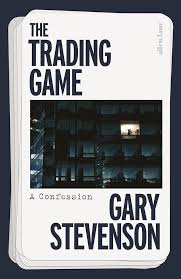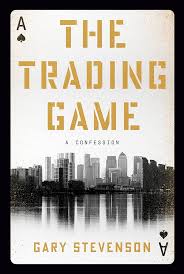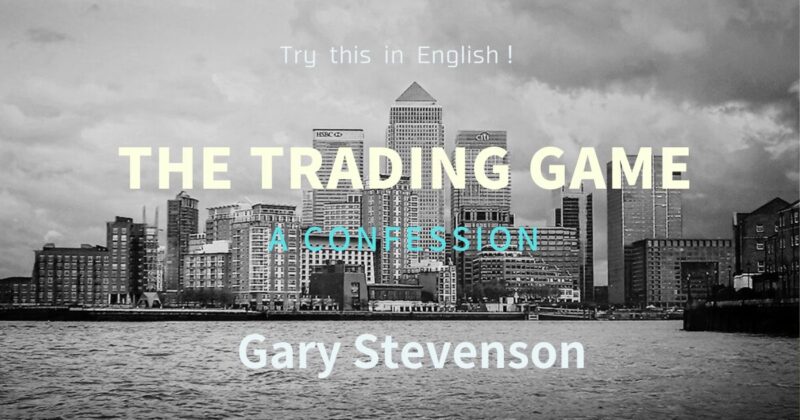Hello! It’s konkaz (@konkazuk).
This time, I would like to introduce a book that is likely to become one of the most important books of the 21st century, even though we are still in the first half of the century.
The book is
“The Trading Game” by Gary Stevenson.
Since its release in March 2024, it has rapidly attracted a large number of readers in many countries, including here in the UK.
(Above is the UK cover, and below is the US cover👇)


“The Trading Game” is an invaluable autobiography that provides insight into the mind of its author.
Born into a working-class family, he became a highly successful trader at a very young age, but soon started questioning his career.
The book narrates his struggles and challenges as he quits his job and transforms into an activist.
Understanding what is happening in today’s global economy and realizing the urgent need for collective action to address the critical situation, Gary immediately launched his YouTube channel, Gary’s Economics, at the start of the pandemic to spread awareness.
Regarding the book’s content, there might be some overlap with the video clips where Gary talks about his life up to the present, which are hosted on other people’s YouTube channels.
However…
in fact, reading the book (or listening to the audiobook) is several times more interesting and impactful.
Therefore, in this article, the reasons are summarized.
Reader friendly for Japanese people!

The reason why this original English book is especially accessible for Japanese readers is that…
it begins with a scene in a Japanese restaurant, and the last quarter of the book is set in Japan!
I guess familiar place names and cultural references in the book create a sense of connection, which is a great factor in helping those who are not completely used to reading English books to read through to the end.
Reading about Japan through the eyes of a foreigner with a different cultural background, who describes it sometimes beautifully and sometimes humorously, is very refreshing in English.
It’s especially entertaining to read about Gary, who visited Japan not as a tourist but as a Citibank trader, being taken to Tokyo’s entertainment district by his colleagues as part of their ‘omotenashi’. His emotional reactions and how he handles the situation are portrayed in a very amusing way.
Furthermore, although he writes about it matter-of-factly, Gary’s determination to find learning opportunities to improve his Japanese is truly admirable.
After finishing the book, you’ll find yourself a fan of Gary.
It has emerged as a fantastic novel!

Autobiographies and memoirs related to politics or economics typically present events in succession, which is great for historical knowledge but honestly not very moving.
(I previously listened to the audiobook of former President Obama’s extremely thick book, and to be frank, it was dull!)
In contrast, Gary’s book is crafted like a novel, making it incredibly entertaining!
First of all, it appears that this was indeed the case, but the characters are simply amazing.
Compared to the other trading desks filled with snobbish, wealthy young men who graduated from elite universities with refined educations, Gary’s FX trading desk was full of nutcases from various backgrounds.
It’s fascinating to see how Gary, as the youngest trader at the company, strategizes his approach to learn about trading from these quirky and challenging senior traders.
The novel vividly portrays the everyday life and behind-the-scenes of the trading workplace, the movement of vast amounts of money, the relationships with brokers, and the tension surrounding the 2008 financial crisis, all of which are typically unfamiliar to ordinary people like us, making the situation palpable to readers.

From a personal standpoint, I felt a similarity to Jack Kerouac’s novels of the Beat Generation in the rapid pace of interactions with various characters, the clash of emotions, and the sense of despair as each day moves unseen towards a darker direction.
Listening to it as an audiobook is highly recommended!

I believe that the author’s emotions come across more directly when reading this book in its original English version (the Japanese version will be released next year?).
Furthermore, I highly recommend listening to it with Gary’s raw voice and his East London accent for a more authentic experience.
Speaking of the East London accent, some people might associate it with a gangster image, as heard in movies like “Lock, Stock and Two Smoking Barrels” or “Green Street”. (lol)
This book is written in the author’s everyday language, complete with lots of swearing. (It’s a pretty normal scene if you’re living in East London…)
And one of the characters, Bill, who is from Liverpool, is at the peak of drunken swearing, and Gary’s impersonation of a Liverpool accent during this moment is fantastic.
By the way, Bill, the trader from Liverpool, is the one Gary admires most among his colleagues. When Gary lost $8 million in just one week and his PnL (Profit and Loss) went over $4 million in the red, he decided to revisit his textbooks. But then, his mentor intervened, slamming the book down and reprimanding him, “The real economy ain’t in no book! Look around you! See for yourself the closures, the homeless people under the bridge, the ads on the tube, your mum’s financial situation, etc.” and gave him a wake-up call.
Moreover, when you listen to the audiobook, you’ll realize how good Gary’s Japanese pronunciation is.
The contrast between his relaxed Japanese pronunciation and his tense moments of speaking in a native Cockney accent creates a fantastic gap in tone.
Summary

Given the way this book is written as a novel, it differs in style from his YouTube channel.
If you can relate to the challenges, frustrations, and despair Gary has faced as detailed in this book, you will gain a deeper understanding of how seriously he aims to save the world through his YouTube channel.
And the ending is super cool!
” I don’t know what’s right and what’s wrong anymore.“
“I don’t care about winning anymore. But, I shouldn’t fight alone next time. Join me for the next game.“
……an emotional ending.
(By the way, even the acknowledgments are impressively cool.)
So let’s all jump aboard Captain Gary’s ship and set off on a journey to take back the future.
If you’re interested, check it out here. 👇
For those who want to listen to the audiobook by becoming an Audible member, click here. 👇
Try Amazon Audible’s free trial for 30days
Finally, I thought Gary was an exceptional figure for our times — unbending in his integrity, sharp-minded, somewhat rebellious like the Pistols, yet maintaining a humble demeanor and committed to justice.
Bye now.
konkaz
*You can read this blog post in Japanese from the link below.
👉 ゲイリー・スティーブンソン著『The Trading Game』のレビューと考察
*You might also want to take a look at this related article
👉 Gary Stevenson: Former Financier Turned Advocate for Economic Equality

